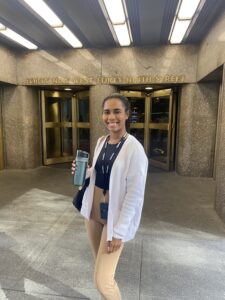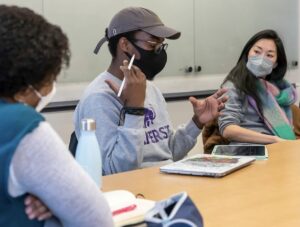The data is clear: College students want networks. According to a Gallup College Alumni poll, when asked to choose from a list of job skills for which they wish they had received more training, nearly half of recent graduates cite networking skills. And on a long list of career-related skills, networking is where students feel least confident, by a wide margin.

The data is also clear that access to networks is not equally distributed. Recent Strada analysis showed that first-generation students and students of color are much less likely to participate in activities that build their networks — including networking with alumni, talking to faculty about their career interests or job-shadowing professionals — than their peers.
Those gaps are a troubling harbinger of unequal labor market outcomes post-college.
An estimated half of internships and jobs come through personal connections. And even before job-getting, data also suggests that students’ networks deeply impact the career options they’re aware of and their satisfaction with their education.
Adding networking to career preparation
The good news is that building networks doesn’t need to be so elusive. Colleges and universities are awash in potential relationships to leverage, ranging from peers to faculty to alumni.
The not-so-good news? To date, building and mobilizing those networks has remained largely on the periphery of what is taught in school or prioritized on campus. Traditional coursework focuses on academic knowledge and skills. Career services staff guides the students they manage to reach through processes such as resume writing and interview prep, but these staff members rarely step in to offer all students opportunities to practice building their networks or to broker new connections otherwise out of reach.
In turn, the enormous role of networks remains at the heart of a hidden curriculum around what it takes to convert hard-earned degrees into lifelong careers.
But the art and science of building and leveraging social capital is, in fact, teachable. A range of experiential learning curriculum tools are starting to emerge that can demystify network-building and make access to social capital a more explicit and equitable feature of students’ college experience.
Social capital as a literacy
Social Capital Builders, a Black-owned social enterprise, has long sought to teach network building as a literacy, akin to financial literacy. Its approach is deeply asset-based, offering lessons aimed at helping young people tap into the resources that might otherwise lie dormant in their networks.
In 2020, during her senior year of high school in New York City, Luz Perez completed SCB’s curriculum, “Foundations in Social Capital Literacy.” In it, students learn about the science of social capital, analyze their networks and practice building trust and reciprocity with those around them to help them accomplish their goals. Throughout the networking course, Luz tracked her progress on an Excel spreadsheet that she says “would keep me accountable on the relationships that I was building.”
Fast forward to Luz’s freshman year in 2021 at Fordham University. College had proved difficult in new ways.
“In high school I was a top student, and I was now getting a 2.4 GPA, and I actually failed a class,” Luz recalls. “What the heck is going on? … The first semester of my freshman year, I was very shy, very quiet. I didn’t ask for help at all.”
Realizing she needed to apply what she learned from Social Capital Builders, Luz reached out to a faculty member, professor Clarence Ball. She’d met him years before at a career pipeline program in high school.
“We hadn’t spoken in so long,” she says. “When I went and told him everything about how hard my freshman year was, he was like, ‘No. Now we are going to meet every Thursday, and you are going to tell me every little detail — what went well, what went bad — and I am going to help you.’”
When she was struggling in math class, he made sure she got calculus tutoring — and offered to help pay for it if needed.
Learning to interact and seek help
Besides lending valuable support and resources, Ball’s own story inspired Luz.
“He was like ‘I went through the exact same thing.’ He said he got kicked out of high school, and now he works at Fordham. That motivated me, and it showed me that just because this little thing happened, that doesn’t matter,” she says.
Her second semester, Luz rebounded. “My GPA went up to 3.2, and it is because I asked for help and that builds your confidence,” she says.

Ball also helped her to start to think bigger. At his recommendation, she started researching internships. She googled “accounting internships for freshmen” and discovered internship opportunities with Bank of America and Deloitte. She remembers, “I actually didn’t know what the heck Deloitte was.” She applied anyway.
In preparing for the interview, she remembered her mom telling her, “Just be yourself.”
Yet again, the lessons she’d learned in high school rang true. “In Social Capital Builders, they said that your mom could be your biggest support and you don’t even know because you don’t think she has that experience. She’s why I aced the interview. Social Capital Builders helped me get that internship because I learned to use the resources around me,” Luz says.
From warm connections to cold calls
Luz’s experience illustrates the power of teaching students that they already possess valuable social capital and inspiring them to tap into existing relationships. Networking isn’t just meeting new people from far-flung communities; it’s also having new conversations with people you already know, from professors to close family members.
In other cases, students may benefit from networking in the more traditional sense of the word: reaching out beyond those they already know to gain access to new perspectives and opportunities.
That’s where another curriculum provider, Career Launch, is making a play. Career Launch partners with two- and four-year colleges to offer a mix of short, text-message-based microlearning videos; an interactive workbook; and group coaching sessions geared toward boosting students’ ability to proactively create relationships with professionals in their fields of interest.
Honing that ability can prove key for students looking for opportunities to put their skills to work.
A foreign student’s networking success story
“You have to work hard to gain the skills that you need to be successful in your industry,” says Takudzwanashe Mhuru, a 22-year-old international student currently studying computer science and statistics at Amherst College.
Taku, as he’s known to his friends and colleagues, is a junior from Zimbabwe. As a student coming from another country, taking the summer or a year off isn’t a possibility because of visa requirements. Always thinking ahead to the next break, searching for the next internship or project, Taku hit the ground running as a freshman to work on his resume and gain the work experience he would need to pursue a career in data science.
When his college’s career center told him about a nonprofit program called Career Launch, he was skeptical at first.
“To be honest I didn’t believe in it. The way it was described, it sounded like something that I needed. So it surprised me that none of the [other] sophomores and juniors knew about it. Maybe this is a scam, or maybe this is something that doesn’t work as well as they say,” he recalls.
In the end, he decided that it wouldn’t hurt to try, and he spent the month working with a small group of peers to guide himself through the “Launch Your Career” workbook.
The workbook covers topics that seem simple but aren’t always intuitive if you’re just starting off your career, such as putting together a professional LinkedIn page, how to craft cold call emails asking for informational interviews, and knowing what to say in those interviews.
Helping students navigate a Catch-22
By breaking down that process, Career Launch aims to overcome the maddening Catch-22 that students like Taku face: Without relationships and work experience, you can’t get a job. Without a job opportunity, you can’t build relationships and work experience.

“The main reason why it was hard for me to navigate getting a job in the first place was because I didn’t know anyone that I could ask,” Taku says. “It is very difficult when you are the first person in your family to go to college in another country. I didn’t have anyone I could speak to about finding a job or finding internships or things like that, so I had to really start from scratch.”
He reflects, “You can work very hard, but sometimes, if you don’t know anyone who can give you access to opportunities, then that hard work doesn’t lead to anything. I’ve learned that reaching out to people and researching about them is part of the work that you have to do to build your network.”
Supported by a group of peers going through the same process, he successfully landed a summer job with professor of computer science Mark Santolucito at Barnard College, who also is an alumnus of Amherst, after sending him a cold email.
“With Career Launch, I learned how to find a connection with someone and send an email; talk to them about their career; and ask them how they did it. You start building from that. … I feel like the skills and the lessons that I learned from the program helped me to get the confidence I needed to reach out, ” Taku says.
The power of a like-minded peer group
Career Launch’s group coaching approach also strives to build peer-to-peer social capital on campuses. The 10 peers in Taku’s group were eager to trade notes.
“We advise each other and share information. They asked me: ‘How did you do it?’ ‘What did you include in your email to Mark?’ or ‘What was the conversation like, and how did you direct it towards you getting a job?’ To this day, we keep talking about things like this: ‘How do you get the opportunities that you end up working on?’”
Beyond giving Taku his first career-related job opportunity, his connection to Santolucito has brought Taku a cascade of recommendations and job supports, such as building a professional website, learning how to represent himself in the computer science industry, and discovering how to make his code more accessible. And the more the two have worked together, the more reciprocity they built.
Taku recalls, “I reached out during winter break, and he was working on an application and needed help visualizing metrics. Without much direction, I thought about what would be interesting, and I visualized graphs and wrote a report. I think he was very impressed; he didn’t expect me to write a report.”
Taku suspects his work helped him get a recommendation letter from Santolucito for an internship at Stanford: “He was confident with my data analysis skills, and he continues to point me to other programs as well.”
Taku and Santolucito’s story illustrates how curriculum that boosts students’ access to and confidence in networking is not just about expanding who students know — but who knows them and what they’re capable of.
Building social capital helps individuals and society
More network-building pays more dividends. For example, the education-to-employment organization Project Basta’s data analysis from their own career diagnostic revealed that students getting first interviews were two times more likely to have done some networking. And according to another analysis by Strada, seniors who participated in career-preparation activities — particularly networking and social capital-building — reported greater confidence in their workplace skills and clarity in their career plans.
But efforts to expand access to diverse networks isn’t just about leveling the playing field; it’s about making the playing field better.
Networks are channels through which resources and power are exchanged. By ensuring that all students — not just those with the greatest wealth and privilege — are able to deepen and diversify their networks, the institutions, professionals and industries to which they are connecting benefit too.
“It not only benefits the people who are getting access; it also benefits the places in which they are getting access to,” Taku says, reflecting on the ripple effect that his new connections are creating.
“If you think about companies that do AI and machine learning, sometimes their products end up not working on the general population because they don’t have diversity in the workspace. To spend so much money on a project that doesn’t work is a loss to them,” he says. “But if they were more inclusive — if they had people from all backgrounds and experiences as part of their workforce — then they would make products that were applicable and that would help everyone. It is actually a symbiotic relationship which benefits everyone.”
Julia Freeland Fisher is the director of education research at the Clayton Christensen Institute. Her work aims to educate policymakers and community leaders on the power of disruptive innovation in the K-12 and higher education spheres. Be sure to check out her book, “Who You Know: Unlocking Innovations That Expand Students’ Networks.”
Opinions expressed by SmartBrief contributors are their own.
_________________________
Subscribe to SmartBrief’s FREE email newsletter to see the latest hot topics on higher education. It’s among SmartBrief’s more than 250 industry-focused newsletters.
